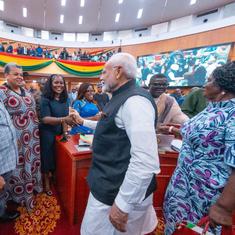Jason Grunebaum, translator from Hindi to English
I recommend Zero Degree by Charu Nivedita, brilliantly translated from Tamil by Rakesh Khanna and Pritham K Chkravarty. The book’s dedication to Kathy Acker signals that we’re in baudy and riotously experimental terrain. There’s a manic genius to Nivedita’s prose that pulsates with life and lust, with a few multiple-choice quizzes thrown in, while the lucky reader traverses genres and canons from Pondicherry to Patagonia.

Jayasree Kalathil, translator from Malayalam to English
Father may be an elephant and mother only a small basket, but… is Shyamala’s first collection of short stories translated from Telugu. Translated by Diia Rajan, Sashi Kumar, A Suneetha, N Manohar Reddy, R Srivatsan, Git Ramaswamy, Uma Bhrugubanda, P Pavana, and Duggirala Vasanta, the stories are rooted firmly in the author’s lived world, her connection with her community and family, and the myriad pleasures, pains, challenges, and triumphs within. The book is deeply connected to its ecology, geography, caste, gender and socio-political realities, its food, music and culture.
In Telugu, Shyamala writes in the language used by Dalits in the Tandur region of western Telangana. By its very insistence on appearing on the written page, it makes an intervention into the politics of language and how it is mainstreamed. I love that several translators are involved in rendering the stories into English, bringing with them a variety of language use and its cultural politics, both in Telugu and in English. To me, this collaborative approach has produced a vibrant translation that is alert to the nuances and playfulness of Shyamala’s writing. This is one book that deserves to be read much more widely.

Keerti Ramachandra, translator from Kannada and Marathi into English
Aliyah: The Last Jew in the Village, by Sethu, translated from the Malayalam by Catharine Thankamma, is a novel set in the small Jewish community of Cochin, where everyone aspires to return to the home land, Israel, once they get the Aliyah, the permission to emigrate. Young Salomon must make the choice whether to stay in the land where his ancestors found refuge, which he thinks of as “home”, or to migrate to a country he knows nothing about.
The novel describes a slice of history of god’s own country that few people know or care to find out. The translation smoothly and fluently brings out the religious, cultural, ethnic, diversity of the region in general and the complex interpersonal relationships of a conservative traditional community in particular, but it retains just the right degree of “strangeness” that a translation should. I would rather say this is an English translation of a Malayalam novel than that this English novel reads just like it was written in Malayalam.

Aruni Kashyap, translator from Assamese to English, writer in Assamese and English
Arun Sharma’s On a Wing and a Prayer is a rivetingly told, perfectly structured novel about Gojen, a lower caste character in rural Assam negotiating the nationalist struggle and Partition violence. However, the most wonderful and tender aspect of the novel is the depiction of East Bengali migrants. Gojen and his rocky relationship with Hasina, or the rebellious Joba who enjoys sex with her lover in the temple after covering the face of the goddess are only some of the subversive moments in the book.
This is a book the half-pant uncles and easily-offended neoliberals would be scared of since it raises complex questions about religion and identity and exhorts us to accept that there are no easy answers to these questions – or perhaps there are no answers at all. It has been translated from the Assamese to English by Maitreyee Siddhanta Chakravarty.

Poonam Saxena, translator from Hindi to English
I really enjoyed the Bengali novel Chowringhee by Sankar, translated by Arunava Sinha: an old, grand hotel as the centrepiece, with gripping stories of the people, both guests and employees, who walk in and out of its doors. It’s the kind of novel I instinctively love, set in the past, bringing to life a time and place that’s now lost. Arunava’s lovely translation made the book memorable.

N Kalyan Raman, translator from Tamil to English
Set in the Kolkata of the 1980s, Hangwoman by KR Meera is an ambitious novel which weaves in important events of social history, along with the condition of women in it, as told from the perspective of a family whose traditional occupation is that of the hangman.
The main narrative revolves around a 20-year-old girl from this family who succeeds her father as the first hangwoman of the country, and the unforeseen consequences set off by this event. Fiercely imagined, Hangwiman is a haunting account of the unending struggle of women for freedom and dignity, a struggle waged as much with themselves as with the male-dominated world. J Devika’s translation of this sprawling and complex novel from the Malayalam is pitch-perfect, a stellar achievement in its own right.

Mamta Sagar, translator from Kannada to English, poet
As one of the translated books from India that need mention, I recommend Halla Bantu Halla, a Kannada novel by Srinivasa Vaidya translated by Maithreyi Karnnor as A Handful of Sesame. It is a story of internal migration set in northern Karnataka, a region most underrepresented in Kannada literature, and more so in English. The novel traces the changing times with reference to important historical contexts, such as the nationalist movements and the assassination of Mahatma Gandhi.
Interwoven with narratives disclosing nuances of caste and patriarchy, the novel portraits how imagining a nation or nation-building seeps into deciding authority and power within families that reinvoke hierarchies in the name of tradition. The translation not only presents flavours of the dialect from the region, but also successfully captures the humour and local flair.
While the mainstream and Kannada popular culture continues to portray north Karnataka and its associated references either in the form of caricatures or as negative elements, Halla Bantu Halla marks the regional nuances and its contributions to larger changes in history. A Handful of Sesame introduces all of these in English, and remains one of my favourite works in translation.

Bhaskar Chattopadhyay, translator from Bengali into English, writer in English
Indigo by Satyajit Ray, translated by Gopa Majumdar, is a collection of crisp stories with extremely vivid descriptions. The voice itself is unique and difficult to replicate in another language. One can only imagine how daunting the task of translating Ray can be. Majumdar pulls off this difficult task, and how! She manages to capture not only the essence of the stories, but also retains Ray’s inimitable style.

Daisy Rockwell, translator from Hindi to English
Literary translations are too often judged in terms of accuracy rather than literary merit. Accuracy is of course deeply important, but the best translations are those that become works of literary merit on their own terms. Muhammad Umar Memon’s translations from Urdu are stunning creations in English, especially his renderings of Naiyer Masud’s lyrical elliptical tales in Collected Stories of Naiyer Masud are for me his most stellar achievement.

Rakhshanda Jalil, translator from Urdu to English
My vote goes to the Hindi lyrics of “Hum Hongey Kaamyaab” by Girija Kumar Mathur, who translated “We Shall Overcome”, a song associated with the civil rights movement in America, in turn, inspired by the hymn “I’ll Overcome Some Day” by Charles Albert Tindley. I like the fact that this gospel song has journeyed from its essentially religious moorings to become a song of protest and affirmation, sung as it was by protestors across racial divides and singers as diverse as Joan Baez, Pete Seeger, and Bruce Springsteen.
Journeying across languages and barriers is the very essence of any act of translation and nothing, to my mind, exemplifies this movement better than this song which has had such a long journey from the 1900s till now, catering as it has to diverse peoples and times over a century. For us in India today it is brimful with meaning and agency. It needs to be sung repeatedly as an anthem for our times and its translator needs to be acknowledged.
Disclosure: Arunava Sinha is a consulting editor with Scroll.in.










